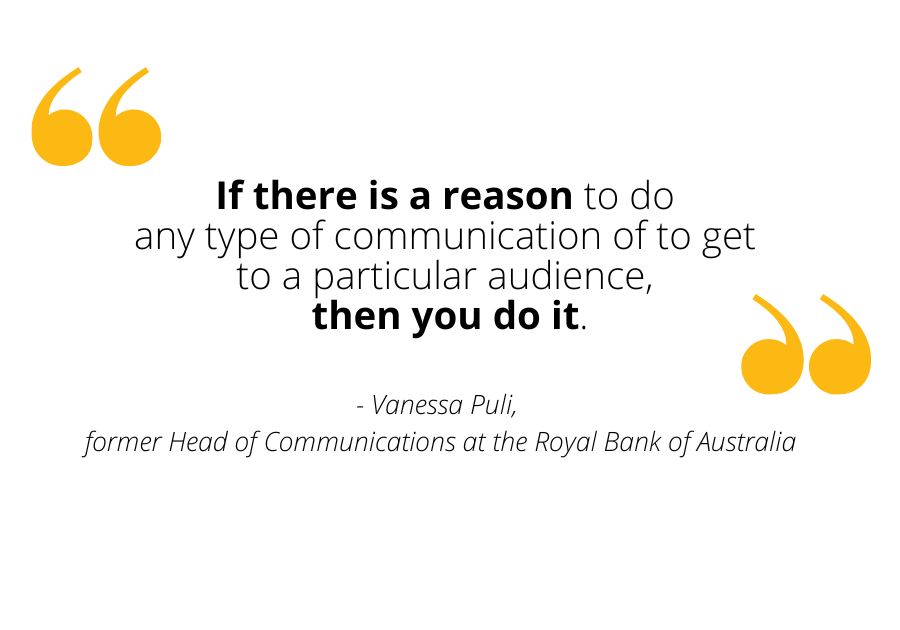In this episode we’re asking a question I’ve been dying to tackle. Should leaders avoid social media? Now, I expect this to be one of the harder conversations I’ll have on this podcast, but I’ll try my absolute best to remain balanced and partisan throughout, which I think is important as whether I think leaders are better placed avoiding social media or not, the vast majority still do or don’t use it properly. This episode is all about understanding that mindset.
Fortunately, I had the opportunity to tackle this one with two very credentialed guests who have been critiquing social media’s merits from a communications, leadership and reputation risk lens for many years between them. The former Head of Communications at the Reserve Bank of Australia (RBA), among many other roles, Vanessa Puli and the former GM of Media and Communications at the Australian Stock Exchange (ASX) and committed Shakespearean, Matthew Gibbs.
Take a read of a snapshot of our conversation below and be sure to subscribe to the newsletter too so you don’t miss a beat.

Roger Christie: The thing that I want to tap into as part of this conversation is the fact that you’ve both sat in communications chairs of organisations that have had a fairly high profile, both in a regulatory capacity and also from a scrutiny point of view from the media and public. So I’ve got no doubt that you’ve grappled with this question around should leaders avoid social media or been asked it many, many times before. As have we I should say at Propel having worked with the likes of the ACCC. So we understand it can be a challenging and complicated question to answer and it isn’t at all black and white. So, Vanessa – in your opinion, should leaders avoid social media?
Vanessa Puli: I truly believe you should think about this in the same way you would think any other type of communication. The who, what, why, when, and the risk management is exactly the same. It doesn’t matter what the communications channel is. The questions are still the same. Why would you do it? What are you going to get out of it?
And I think that’s probably one of the issues. When we talk about reputation and social media, we almost talk about it as if it’s a popularity contest. Reputation is not a popularity contest. It’s not a central bank’s governor’s job or a senior executive’s job to be popular. If there is a reason to do any type of communication of to get to a particular audience, then you do it. You don’t do it otherwise.

Matthew Gibbs: I agree. You may as well ask, should CEOs or leaders avoid drinking or driving or supporting the Sydney Roosters? Well, that’s given I’m a Sea Eagles fan. But, I mean, seriously, there are risks associated with so many things, including being on social media. But that’s not a reason of itself not to engage. It always comes back to those fundamental principles: Why engage? What’s your purpose? Can you do it authentically?
And then on top of that, I think social media offers some new bells and whistles that the carrier pigeon and the fax machine and some of the other things I mentioned earlier don’t have. You can reach a whole lot more, a much greater audience of stakeholders more directly and quicker, using various social media platforms than you could have in the past. So there are attractions to leaders using social media, not avoiding it. It’s simply a question of how you engage with it.
I also think there’s another implicit question your master question, which is, who are our leaders? Do we have enough of them? How do we want them to talk to us?
Vanessa Puli: Yes, because that’s the other thing, right? One of the arguments about a CEO doing social media is it’s important for employees and prospective employees to see the culture and values of an organisation, right? And the other thing that we see more and more is for people to be commenting on other things on social media – aspects of the day, whether that’s gay marriage, the indigenous Voice etc. We’re expecting from a CEO for them to take a position that’s leading us somewhere that has nothing to do with an organisation.
And the other thing I would say when it comes to authenticity – it’s important to ask yourself: am I the right person to be talking about this? Even if I have a view on a subject, am I the right person to be talking on this? I think when it comes to social media, that’s a big question too, particularly depending on the audience. If your audience is a particular demographic or a particular type of person within or external to an organisation then, for example, is the middle aged white person, fuddy duddy in a suit at the top of the organisation the right person to be doing that communication via that channel? Are they the right voice? You would ask those questions regardless of the channel.
Matthew Gibbs: It comes back to – leaders probably shouldn’t avoid much at all, as long as the checklist of: what, why, how – and a dozen other questions, including what’s the purpose, what’s the intended outcome, etc. are answered satisfactorily. And then the answer is probably going to be, well, yes, let’s do it under these terms and conditions.
And, sometimes the answer to: Should leaders avoid social media is yes. Sometimes they should. It shouldn’t be binary as in you either speak or you say nothing. Sometimes silence is also the best type of leadership depending on the circumstances. Leaders aren’t chatterboxes. They’re not necessarily talking all the time across whatever platform, including the various social media ones. So as Ecclesiastes tells us, there is a time for silence and a time to speak, but a time for silence as well. And that is a very critical part of a leader’s armory.

Vanessa Puli: And to add to that – regardless of the clamouring. It still might be the right answer to be quiet even if you get shot it – it still might be the right answer. And that goes back to this. It’s not a popularity contest. It’s a reputation.
So should leaders avoid social media or not? Tune in to listen to the debate in full and where Roger, Vanessa and Matthew landed at the end of the conversation. The journey, insights and conversation as a whole is rich with wisdom and insights every comms leader and leader themselves can learn from.
Feel free to drop Roger Christie a note with any thoughts from this conversation. If you want more on all things digital reputation, be sure to subscribe below to the Your Digital Reputation newsletter packed full of advice, trends and the best leadership examples just for you.

